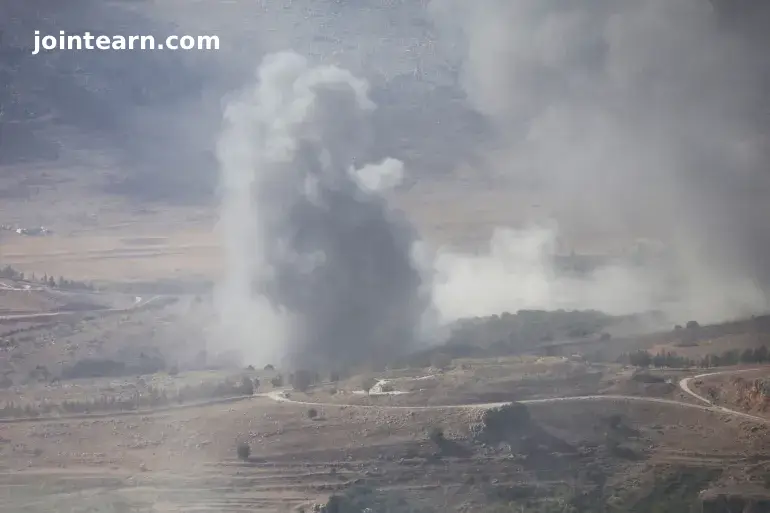
Tel Aviv / Gaza / Beirut / Damascus — Despite an October 10 ceasefire agreement aimed at halting hostilities in Gaza, Israel continues to conduct military operations across the Middle East, launching attacks on Lebanon, Syria, and the occupied West Bank.
The ceasefire, brokered with the support of the United States and regional mediators, was intended to de-escalate tensions after months of devastating conflict in Gaza. However, recent developments suggest that Israeli military activity remains widespread, intensifying regional instability and drawing growing criticism from Arab nations and international observers.
Ceasefire in Gaza Fails to Bring Broader Peace
While the truce has temporarily reduced large-scale bombardments in Gaza, Israeli airstrikes and ground incursions continue intermittently. The agreement’s implementation has been marred by Israeli violations, including drone attacks, troop movements beyond designated withdrawal lines, and restrictions on humanitarian aid entering the enclave.
U.S. Vice President JD Vance, during his visit to Israel last week, described the ceasefire as going “better than expected.” Yet, on the ground, Gazans report ongoing suffering. On Saturday night, one Palestinian was killed and four injured in a drone strike targeting Gaza’s Nuseirat refugee camp, according to Al-Awda Hospital.
Since the ceasefire began, nearly 100 Palestinians have died, and aid convoys remain blocked, preventing food, fuel, and medical supplies from reaching critical areas. Israel has also been accused of denying exit permits for medical patients, including those with life-threatening conditions.
“Israel destroyed Gaza’s medical infrastructure,” said Rasha Abu Sbeaka, a cancer patient awaiting treatment abroad. “Now they won’t let me leave.”
West Bank: Escalating Crackdown and Annexation Push
In the occupied West Bank, Israel’s military continues an aggressive campaign of raids, arrests, and settler violence. Over 1,000 Palestinians have been killed in the territory since October 2023, according to Palestinian sources.
Israeli settlers, often escorted by soldiers, have attacked Palestinians during the annual olive harvest season, a crucial economic and cultural period for rural communities. Detainees include individuals previously released under past ceasefire prisoner exchanges.
Finance Minister Bezalel Smotrich has reignited annexation rhetoric, calling on supporters to pressure U.S. President Donald Trump to endorse Israeli sovereignty over the West Bank.
“We must declare sovereignty now,” Smotrich said. “This is the only way to end the dangerous illusion of a Palestinian state.”
Syria: Daily Incursions and Border Violations
Israeli forces have intensified incursions into southern Syria, conducting airstrikes, reconnaissance missions, and ground raids despite the collapse of former President Bashar al-Assad’s regime late last year.
According to Syrian state media (SANA), Israeli troops established a temporary checkpoint between the villages of al-Razaniyah and Sayda al-Hanout in Quneitra, detaining a local bread distributor before withdrawing.
Syria’s UN representative Ibrahim Olabi condemned Israel’s “aggressive and expansionist behavior,” urging the UN Security Council to enforce the 1974 Disengagement Agreement. Israel maintains that the agreement is “void” following Assad’s downfall.
Local media report frequent overflights, detentions, and sabotage operations in Quneitra, as Israel seeks to suppress potential threats near its northern frontier.
Lebanon: Renewed Border Clashes and UN Confrontations
In southern Lebanon, hostilities between Israel and Hezbollah have intensified, despite a November 2024 ceasefire that officially ended the previous war. Israeli airstrikes have destroyed infrastructure, displaced civilians, and reignited fears of a new conflict.
On Monday, the UN peacekeeping mission (UNIFIL) shot down an Israeli drone after it dropped a grenade near a patrol unit. In retaliation, an Israeli tank reportedly fired on the peacekeepers, though no casualties were reported.
Earlier, Israeli air raids killed two people in Nabi Chit, Baalbek, and Naqoura, continuing a pattern of near-daily attacks.
The Lebanese government has accused Israel of occupying five border points and violating the truce terms, while U.S. Envoy Tom Barrack has failed to persuade Israel to withdraw its forces.
“Our people are exhausted,” said a Lebanese farmer from Tyre. “Every time we rebuild, Israel destroys again.”
Israeli media recently reported that the army conducted war games simulating a Hezbollah invasion, despite widespread skepticism that the group could mount such an attack under current conditions.
Regional Implications and International Response
The persistence of Israeli military operations beyond Gaza underscores a broader strategy to maintain regional pressure on neighboring states and non-state actors. Analysts say this approach aims to prevent the reemergence of coordinated resistance networks along Israel’s borders.
However, human rights organizations warn that Israel’s ongoing aggressions risk destabilizing the entire region and undermining diplomatic progress. The United Nations, Arab League, and European Union have each called for restraint, but the U.S. remains reluctant to hold Israel accountable publicly.
“The ceasefire in Gaza means little if Israel continues attacking Lebanon, Syria, and the West Bank,” said Rami Khouri, a Middle East analyst. “What we are witnessing is not de-escalation — it’s regional militarization under the guise of truce.”


Leave a Reply